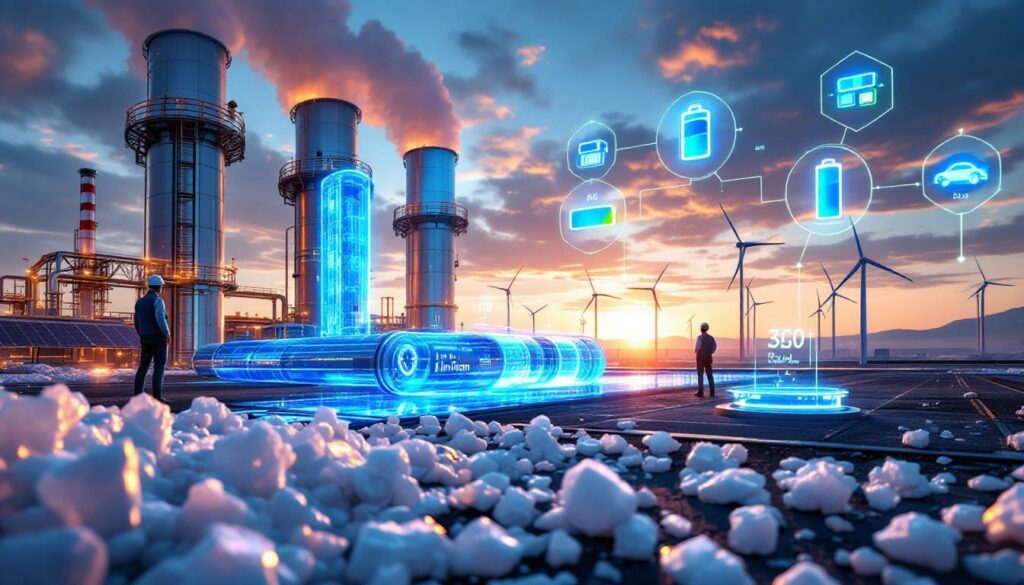Vulcan Energy Secures €104 Million in German Government Grants for Clean Lithium Project
In a significant development for European battery supply chains, Vulcan Energy has secured €104 million ($122 million) in government grants to advance its clean lithium production initiative in Germany. This funding package, announced on July 22, 2025, represents a major milestone in Europe's push to establish domestic critical mineral resources and reduce dependency on imports.
The comprehensive funding comes from multiple German government sources, including the federal government, the state of Rhineland-Palatinate, and the state of Hesse. The grant distribution follows a structured timeline with disbursement beginning October 1, 2025, and continuing over 36 months.
"This funding is designed to assist with building Germany's and Europe's critical raw materials supply chain resilience," stated Vulcan Energy in their announcement. The timing aligns strategically with the EU's implementation of the Critical Raw Materials Act, demonstrating a coordinated approach to resource security.
How This Funding Supports European Battery Supply Chain Development
The multi-level government backing from federal and state authorities signals Germany's serious commitment to developing domestic battery material resources. This coordinated funding approach demonstrates how strategic industrial policy is being implemented to address critical minerals energy transition vulnerabilities.
"The funding specifically targets a project designed to strengthen Germany's and Europe's critical raw materials supply chain resilience," according to Vulcan Energy's official statement. This positions the project as a test case for implementing the EU's broader resource security legislation.
The Strategic Importance of the Grant Package
The €104 million funding represents more than simple financial support—it demonstrates Germany's comprehensive approach to critical mineral security. By involving both federal and state governments, the package creates multiple stakeholders with vested interests in the project's success.
This phased funding approach allows for systematic development of Vulcan's innovative lithium extraction technology while ensuring proper oversight of public funds through milestone-based validation and financial controls. The structure reduces execution risk while maintaining accountability.
Implementation Timeline and Distribution
The grant follows a carefully structured timeline:
- Disbursement begins: October 1, 2025
- Duration: 36 months
- Total value: €104 million (approximately $122 million at current exchange rates)
This timeline aligns perfectly with the EU Critical Raw Materials Act implementation phase (2025-2027), positioning Vulcan Energy to become one of the first companies to successfully deliver on the policy's domestic production targets.
Why Clean Lithium Production Is Critical for Germany's Industrial Future
Europe currently imports more than 80% of its battery-grade lithium, primarily from China, Australia, and Chile. This dependency creates significant vulnerabilities for the continent's growing electric vehicle and energy storage industries.
The Battery Materials Supply Chain Challenge
Germany and Europe face several interconnected challenges in securing battery materials:
- Supply vulnerability: Heavy reliance on imported lithium from a limited number of countries
- Geopolitical risk: Recent export controls and trade tensions affecting mineral supply
- Environmental concerns: Traditional lithium mining methods have significant ecological impacts
- Carbon footprint: Conventional lithium production emits 5-15 tonnes of CO₂ per tonne of lithium carbonate equivalent
- Price volatility: Limited supply sources create unstable pricing for European manufacturers
Recent supply disruptions affecting German automakers highlight the concrete risks of import dependency. As battery demand grows exponentially with EV adoption, securing stable domestic supply becomes increasingly critical.
Germany's Strategic Response
The substantial grant to Vulcan Energy represents part of Germany's multi-faceted approach to addressing these challenges:
- Developing domestic sources of critical battery materials
- Prioritizing environmentally sustainable extraction methods
- Creating regional supply chain resilience
- Supporting innovative technologies that align with climate goals
- Reducing the carbon footprint of battery production
By investing in domestic lithium production, Germany aims to shorten supply chains, reduce transportation emissions, improve supply security, and create new technical expertise within Europe.
What Makes Vulcan Energy's Lithium Production Approach Unique
Vulcan Energy's project stands out for its innovative geothermal lithium extraction technology, which offers significant environmental and economic advantages over traditional methods.
Geothermal Lithium Extraction Technology
The company utilizes a distinctive integrated process:
- Mineral-rich brine is pumped from deep geothermal reservoirs
- Lithium is selectively extracted via specialized adsorption technology
- Depleted brine is reinjected into the reservoir, maintaining environmental balance
- Renewable geothermal energy is simultaneously generated during the process
- The resulting lithium has a near-zero carbon footprint
This closed-loop system leverages existing geothermal infrastructure in Germany's Upper Rhine Valley, maximizing resource efficiency while minimizing environmental impact.
Environmental and Economic Advantages
Compared to traditional lithium production methods, Vulcan's approach offers multiple benefits:
- Minimal land disturbance: No open-pit mines or large evaporation ponds required
- Reduced water consumption: Approximately 90% less water used compared to evaporation methods
- Renewable energy co-production: Creates clean power alongside lithium extraction
- Circular resource use: Brine is returned to its source after lithium extraction
- Zero carbon production: Significantly lower emissions than conventional mining
- Battery-grade output: Targeting >99.5% purity lithium hydroxide directly from brine
These advantages position Vulcan's technology as potentially transformative for the lithium industry innovations, establishing new benchmarks for environmentally responsible production.
How This Development Impacts the Global Lithium Market
Vulcan Energy's project, backed by substantial government funding, could influence global lithium markets in several significant ways as it scales toward commercial production.
Shifting the Lithium Production Landscape
The development introduces several potential market changes:
- New supply geography: Establishing Europe as a significant lithium producer outside traditional regions
- Capacity expansion: Vulcan aims for 24,000 tonnes/year LCE by 2030—equivalent to approximately 5% of current EU demand
- Price dynamics: Potential to reduce Asian import premiums (currently around $500/tonne)
- Quality benchmarks: Setting new standards for "green" battery materials
- Market diversification: Reducing concentration of supply from current dominant producers
As commercial production scales, Vulcan's project could help reduce price volatility by creating more diverse global supply options, particularly for European consumers.
Implications for Battery Supply Chains
The development of European lithium production capacity has significant implications:
- Localized supply: Shortening supply chains for European battery and EV manufacturers
- Transportation efficiency: Reducing emissions and costs associated with global shipping
- Supply security: Improving stability for European industrial consumers
- Technical expertise: Creating new knowledge clusters within Europe
- Integration opportunities: Enabling tighter coordination between lithium production and battery manufacturing
These benefits could accelerate Europe's transition to electric mobility by strengthening a critical link in the continent's battery value chain.
What Other Companies Are Developing European Lithium Resources
While Vulcan Energy has secured significant government backing, they operate within a growing landscape of European lithium development projects targeting different resource types and extraction methods.
Emerging European Lithium Projects
Several companies are actively developing lithium resources across Europe:
- Hard-rock lithium deposits: Companies exploring pegmatite resources in Portugal, Spain, and Finland
- Clay-based lithium: Projects examining kaolin resources in central Europe
- Geothermal brines: Other companies investigating similar approaches to Vulcan in different European locations
- Recycling initiatives: Companies developing lithium recovery from spent batteries
- By-product recovery: Projects extracting lithium from existing mining waste streams
This diverse approach to resource development helps mitigate the risk of depending on a single technology or extraction method.
Competitive Positioning
Vulcan's substantial government backing provides several competitive advantages:
- Reduced financial risk: Government support lowers capital pressure compared to fully private-funded projects
- Enhanced credibility: Official backing signals project viability to potential customers and partners
- Accelerated scaling: Additional capital enables faster technology development
- Regulatory support: Government endorsement may streamline permitting processes
- Strategic alignment: Clear positioning within European industrial policy frameworks
These advantages could help Vulcan overcome the typical challenges faced by resource startups, particularly the difficult transition from pilot to commercial scale.
What Challenges Remain for Vulcan Energy's Project
Despite the significant funding, Vulcan faces several technical, operational, and market challenges as it works to scale its innovative lithium extraction technology.
Technical and Operational Hurdles
The project must overcome several complex challenges:
- Scale-up complexity: Moving from pilot to commercial scale operations introduces new technical variables
- Lithium recovery consistency: Maintaining reliable extraction rates across different brine compositions
- Quality specifications: Consistently meeting battery-grade lithium purity requirements
- Process optimization: Balancing lithium extraction with geothermal energy production
- Operational efficiency: Managing costs to remain competitive with established producers
The 36-month funding window creates timeline pressure for technology demonstration, requiring efficient execution of the development roadmap.
Market and Competitive Factors
External factors will also influence the project's success:
- Pricing environment: Evolving lithium market dynamics as new supply sources come online
- Competitive response: Established producers expanding capacity or reducing costs
- Battery chemistry evolution: Potential shifts in cathode technology affecting lithium demand
- Regulatory developments: Changes in mining, processing, or environmental regulations
- Customer qualification: Securing long-term offtake agreements with battery manufacturers
Successfully navigating both technical and market challenges will be critical for translating government funding into commercial success.
How This Project Aligns With Europe's Green Transition Goals
Vulcan Energy's clean lithium production initiative aligns closely with multiple European policy objectives, creating synergies between resource security and environmental goals.
Strategic Fit With EU Policy Objectives
The project supports several interconnected European priorities:
- European Green Deal: Contributing to carbon neutrality targets through cleaner material production
- Critical Raw Materials Act: Advancing domestic supply goals for strategic minerals
- Circular Economy Action Plan: Demonstrating sustainable resource extraction principles
- Industrial Strategy: Enhancing strategic autonomy in critical supply chains
- Regional development: Creating high-technology jobs in participating regions
This multi-dimensional alignment helps justify the substantial public investment and positions the project as a template for future initiatives.
Contribution to Climate Targets
The clean lithium production approach specifically supports climate objectives through:
- Emissions reduction: Potential to avoid approximately 1.2 million tonnes of CO₂ annually at full scale
- Renewable energy integration: Demonstrating combined mineral extraction and clean energy production
- Electric mobility enablement: Lowering the overall carbon footprint of electric vehicles
- Sustainable extraction model: Creating templates for future critical mineral projects
- Energy system flexibility: Contributing to grid balancing through geothermal power generation
By addressing both resource security and climate concerns simultaneously, the project demonstrates how strategic industrial policy can deliver multiple benefits.
What's Next for Vulcan Energy and European Lithium Production
With substantial funding secured, Vulcan Energy faces a critical execution phase as it works to translate innovative technology into commercial reality.
Upcoming Project Milestones
Several key developments are anticipated in the coming months and years:
- Pilot optimization: Refinement of extraction parameters based on operational data
- Demonstration plant construction: Scaling up to validate commercial viability
- Offtake negotiations: Advancing agreements with European battery manufacturers
- Automotive partnerships: Potential collaboration with end-users of battery materials
- Full-scale plant development: Moving toward the 2030 production capacity target
The project's progress through these phases will provide valuable insights into the viability of domestic lithium production in Europe. Furthermore, the direct lithium extraction boost could serve as a model for other European projects.
Long-term Industry Implications
The success of this project could catalyze broader changes in the lithium and battery industries:
- Technology transfer: Accelerated development of similar projects in other European regions
- Investment patterns: Increased funding for alternative extraction technologies
- Supply chain integration: Greater vertical coordination between lithium producers and battery manufacturers
- Environmental standards: New benchmarks for sustainability in mineral production
- Market dynamics: Reduced price volatility through diversified global supply
As one of the first major European lithium initiatives to receive substantial government backing, Vulcan's project will serve as an important test case for the continent's resource strategy, potentially leading to advances in closed-loop battery recycling and more sustainable battery production.
FAQs About Vulcan Energy's Lithium Project
What is the current status of Vulcan Energy's lithium production?
Vulcan Energy is transitioning from pilot-scale operations to commercial production, with the new funding expected to accelerate this process significantly. The company is currently operating a pilot plant to validate its extraction technology while working toward demonstration scale.
How does geothermal lithium extraction differ from traditional methods?
Unlike conventional mining or evaporation ponds, geothermal extraction pumps mineral-rich brine from underground, extracts the lithium using selective adsorption technology, and returns the brine to the earth, all while generating renewable energy. This creates a closed-loop system with minimal environmental impact.
What is the expected production capacity of Vulcan's project?
While specific production targets may evolve, the company aims to become a significant contributor to European lithium supply, targeting approximately 24,000 tonnes annually of lithium carbonate equivalent at full capacity by 2030. This would represent roughly 5% of projected European demand.
How does the carbon footprint of this lithium compare to conventional sources?
Vulcan's process aims to produce lithium with a near-zero carbon footprint, compared to conventional methods that can generate 5-15 tonnes of CO₂ per tonne of lithium carbonate equivalent. The integration of renewable geothermal energy in the production process is key to this reduced environmental impact.
What is the timeline for commercial production?
With funding now secured, Vulcan Energy is expected to advance toward commercial production over the next 3-5 years, with initial output possible within the grant's 36-month timeframe. Full production capacity is targeted for 2030, aligning with Europe's broader battery material strategy.
Disclaimer: This article contains forward-looking statements about Vulcan Energy's production capabilities, timelines, and market impact. These projections are based on current information and are subject to various risks and uncertainties that could cause actual results to differ materially from those anticipated. Readers should not rely solely on these projections for investment decisions.
Ready to Invest in the Next Clean Lithium Producer?
Discover how major mineral discoveries like Vulcan Energy's clean lithium project can lead to significant market returns by exploring Discovery Alert's dedicated discoveries page, where our proprietary Discovery IQ model helps investors identify actionable opportunities before the broader market.




